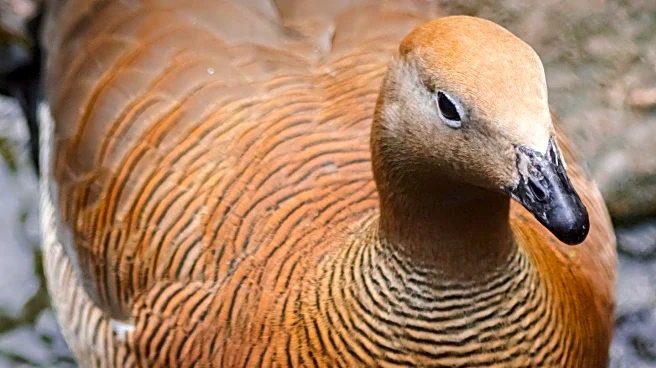What's Happening?
State officials in Hawaii are investigating a potential case of avian influenza in a duck found at the University of Hawaii at Manoa. The Hawaii Department of Health reported that a student discovered the sick duck, which tested positive for the H5 subtype
of influenza A virus. Confirmation of the presence of avian influenza, specifically H5N1, is pending from the National Veterinary Services Laboratories in Iowa. Health officials have stated that the risk of human infection remains low, as human cases are rare and typically linked to direct exposure to infected animals. Avian influenza is highly infectious among wild birds and poultry, with outbreaks affecting dairy cattle herds in 18 states, including California. Hawaii has experienced limited spread of the virus, with no human cases reported. The Hawaii Department of Agriculture & Biosecurity previously confirmed an outbreak at Susie's duck sanctuary in Wahiawa last November, resulting in the death or euthanization of over 70 waterfowl.
Why It's Important?
The potential case of avian influenza in Hawaii highlights the ongoing threat of the virus to wildlife and agriculture. While human infections are rare, the virus poses significant risks to poultry farms and wild bird populations, which can lead to economic losses and disruptions in the agricultural sector. The spread of avian influenza can also impact biodiversity and ecological balance, particularly in regions like Hawaii that serve as habitats for migratory birds. Monitoring and controlling the spread of the virus are crucial to preventing outbreaks that could affect food supply chains and the health of local ecosystems. The situation underscores the importance of biosecurity measures and public awareness in managing wildlife diseases.
What's Next?
Health officials in Hawaii, along with the Department of Agriculture & Biosecurity and the Department of Land and Natural Resources, are closely monitoring health reports and conducting surveillance of poultry farms and wild bird populations for signs of the virus spreading. The confirmation of avian influenza from the National Veterinary Services Laboratories is expected in the coming weeks, which will guide further actions. The public is advised to avoid handling wild birds and to report any unusual illnesses in poultry or livestock to the authorities. As Hawaii enters migratory bird season, vigilance is necessary to prevent the introduction of diseases by wild birds.
Beyond the Headlines
The investigation into avian influenza in Hawaii raises broader questions about wildlife management and disease prevention. The presence of migratory birds increases the risk of introducing new pathogens to the islands, necessitating robust monitoring systems and public education campaigns. Ethical considerations also arise regarding the treatment and euthanization of infected animals to prevent the spread of disease. Long-term strategies may include enhancing biosecurity protocols and investing in research to develop vaccines or treatments for avian influenza.















